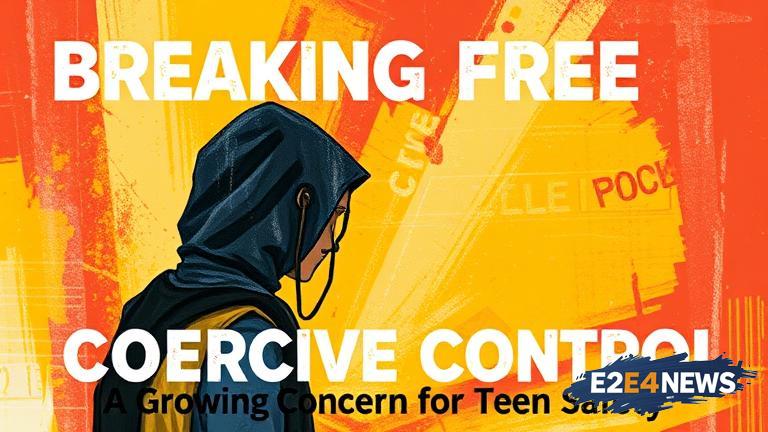Coercive control is a pattern of behavior used by one person to exert power and control over another, often in a romantic relationship. This can include tactics such as isolation, emotional manipulation, and financial control. For teenagers, who are already vulnerable due to their age and inexperience, coercive control can be particularly damaging. Many teens may not even realize they are being controlled, as the behavior can be subtle and insidious. According to recent statistics, 1 in 5 teenagers experience some form of coercive control in their relationships. This can have severe consequences, including anxiety, depression, and even physical harm. Furthermore, coercive control can be difficult to recognize, as it often masquerades as love or concern. Teenagers may feel trapped and unable to escape the relationship, due to fear of retaliation or feelings of guilt and shame. It is essential for parents, educators, and healthcare professionals to be aware of the signs of coercive control and to provide support and resources for teenagers who may be experiencing it. This includes educating teens about healthy relationships, promoting self-esteem and confidence, and encouraging open communication. Additionally, it is crucial to create a safe and non-judgmental space for teens to discuss their concerns and feelings. By working together, we can help prevent coercive control and keep teenagers safe. The issue of coercive control is not limited to any one country or culture, but it is a global problem that requires a comprehensive and coordinated response. In the UK, for example, there have been efforts to raise awareness and provide support for victims of coercive control, including the introduction of new laws and policies. However, more needs to be done to address the root causes of coercive control and to provide adequate support for those affected. This includes addressing societal attitudes and norms that perpetuate control and abuse, as well as providing education and training for professionals who work with teenagers. By taking a proactive and preventative approach, we can help reduce the incidence of coercive control and promote healthy, respectful relationships for all. It is also important to recognize that coercive control can take many forms, including online abuse and harassment. With the rise of social media and online communication, it is easier than ever for abusers to exert control and manipulate their victims. Therefore, it is essential to educate teenagers about online safety and how to protect themselves from abuse and harassment. Moreover, parents and caregivers should be aware of the potential risks and take steps to monitor and limit their teenager’s online activity. Ultimately, breaking free from coercive control requires a collective effort and a commitment to promoting healthy relationships and respect for all. By working together, we can create a safer and more supportive environment for teenagers and help them develop the skills and confidence they need to navigate relationships and avoid abuse. The consequences of coercive control can be severe and long-lasting, affecting not only the individual but also their friends, family, and community. It is therefore essential to take a proactive and preventative approach, rather than simply responding to incidents after they occur. This includes providing education and training for teenagers, as well as for professionals who work with them, such as teachers, healthcare providers, and social workers. By taking a comprehensive and coordinated approach, we can help prevent coercive control and promote healthy, respectful relationships for all. Furthermore, it is crucial to recognize that coercive control is not just a personal issue, but also a societal problem that requires a collective response. This includes addressing the root causes of coercive control, such as societal attitudes and norms that perpetuate control and abuse. By working together, we can create a safer and more supportive environment for teenagers and help them develop the skills and confidence they need to navigate relationships and avoid abuse.





